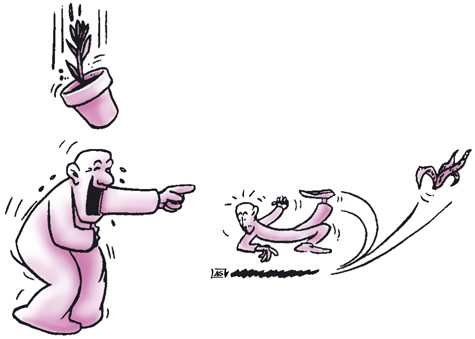
As a visiting researcher in Europe on medicines, I wonder why does the European press report so little about the dangers of medicines that patients take? Is it that European readers do not want to be informed about risks of medicines they take? Or that editors of newspapers and television news think such news is not important? There is a new story every month, and it’s ready to write up.
Aprotinin Take for example a major story about the drug, aprotinin, widely used to reduce bleeding in cardiac surgery (a). It made front-page news in the US when the Food and Drug Administration (FDA) issued a Warning that it significantly increases heart failure and stroke. What put it on the front page, however, was that Bayer had commissioned a study that showed the drug caused high rates of death and renal damage but then did not report the results. European television and printed news made little of it; yet companies are being put in charge of monitoring risks after drugs are approved.
Would Europeans not want to know about this direct conflict of interest? A Bayer executive read current incentives right when he noted that the less evidence of bad news you gather, the less evidence you have that there is bad news. Shouldn’t European viewers and readers be informed and concerned?
Olanzapine In December 2006 a major story broke in the US on secret company documents showing that Eli Lilly managers had covered up evidence that one of the world’s leading drugs for schizophrenia, Zyprexa°, carried high risk of obesity and diabetes (b). According to company emails and documents given to The New York Times, Lilly knew about the high risks before the drug was approved and worked to minimise evidence of it so that doctors would not be informed of the risks to their patients. This story went on for days. European press coverage was minimal. Why?
Hypnotics On 14 March 2007, the FDA decided to issue a serious warning on 14 sleeping medicines taken widely in the US and Europe (c). These pills cause some people to choke or their faces to swell. They cause others to get up and make phone calls, prepare food, and even drive their cars in their sleep, without knowing it. This warning received wide press in the United States but not by most European newspapers or TV news shows.
Why not? Some people tell me that Europeans trust their doctors and trust their government regulators. They assume all is well. If so, they are naïve, and under-reporting keeps them in the dark. It appears that Europeans cannot trust their regulators to be vigorous protectors of their public health, though French vigilance is better than most.
Etoricoxib On 12 April 2007, the FDA (the US regulator) rejected by a vote of 20-1 a new painkiller from Merck called Arcoxia°, because it had almost no benefits and substantial risks of cardiovascular trauma (d). The news is that most European countries have approved this dangerous and useless drug. Merck is marketing it here, and doctors are prescribing it to patients. Yet because of little press coverage, they do not know that the FDA thinks it is useless and dangerous. Shouldn’t pointed questions be asked about why this drug was approved here in the first place and whether it should stay on the market?
Rebates or kickbacks? On 9 May 2007, front-page news broke on large “rebates” to American doctors treating cancer patients for prescribing anaemia medication (e). Six cancer doctors in one practice alone received US $2.7 million for prescribing medication worth $9.0 million to the company. One result is doctors overprescribing and raising red blood-cell counts to a dangerous level. The story makes one want to find out what kinds of rebate or kickback schemes are legal in different European countries and how they are affecting the quality of patient care.
The press is the key to informing the public and to making information about the medicines that Europeans take transparent. Why do papers and TV news programmes report so little, when the stories are ready to be written from key web sites, news sources, and official reports? A well-informed citizenry by an independent press is the best defense against the risks of medicines.
- Professor Donald W. Light, Ph.D
University of Medicine & Dentistry of New Jersey
©Prescrire 2008
Prescrire Int 2008; 17 (97): 218.
Originally appeared in: ISDB Newsletter, October 2007
Notes:
a - See also: Prescrire Rédaction “Aprotinine : hypersensibilités, thromboses et insuffisances rénales” Rev Prescrire 2007; 27 (281): 195; Masquelier P “Aprotinine (suite)” Rev Prescrire 2008; 28 (292): 154-155.
b - See also: Prescrire Rédaction “Effets indésirables métaboliques de l’olanzapine : procès en cascade aux États-Unis” Rev Prescrire 2008; 28 (293): 224-226.
c - See also: Prescrire Editorial Staff, “Zolpidem: sleepwalking, automatic behaviours” Prescrire Int 2007; 16 (91): 200.
d - See also: Prescrire Editorial Staff, “Etoricoxib. Avoid using cox-2 inhibitors for pain” Prescrire Int 2007; 16 (92): 223-227.
e - See also: Prescrire Editorial Staff, “Epoetin: dose dependent excess mortality” Prescrire Int 2007; 16 (90): 156 and this issue page 191.
